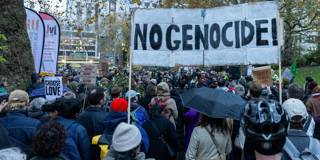Despite the progress made toward preventing mass atrocities, genocide and other crimes against humanity remain a prominent feature of our world. Draft legislation before the House of Lords provides the United Kingdom with a historic opportunity to align its foreign policy with its commitments and stated values.
LONDON – On April 15, some of the world’s leading international lawyers and cross-party UK parliamentarians sent a public letter to British Prime Minister Rishi Sunak and Foreign Secretary David Cameron, urging them to support the Genocide Determination Bill that is currently under discussion in the House of Lords. This legislation, introduced by one of us (Alton) in late 2022, aims to establish an independent and impartial mechanism for preventing mass atrocities and ensuring that the United Kingdom adheres to its obligations under the 1948 Genocide Convention.
In December 2023, the international community marked the Convention’s 75th anniversary. But mass atrocities, including crimes against humanity and genocide, remain a prominent and seemingly permanent feature of our world.
Between 2000 and 2020, at least 37 countries experienced or came perilously close to experiencing mass atrocities. The impact of such crimes extends beyond the immediate harm to their victims. They also lead to massive displacement, threaten international peace and security, and contribute to the rise of authoritarianism, which heightens the risk of future atrocities.

LONDON – On April 15, some of the world’s leading international lawyers and cross-party UK parliamentarians sent a public letter to British Prime Minister Rishi Sunak and Foreign Secretary David Cameron, urging them to support the Genocide Determination Bill that is currently under discussion in the House of Lords. This legislation, introduced by one of us (Alton) in late 2022, aims to establish an independent and impartial mechanism for preventing mass atrocities and ensuring that the United Kingdom adheres to its obligations under the 1948 Genocide Convention.
In December 2023, the international community marked the Convention’s 75th anniversary. But mass atrocities, including crimes against humanity and genocide, remain a prominent and seemingly permanent feature of our world.
Between 2000 and 2020, at least 37 countries experienced or came perilously close to experiencing mass atrocities. The impact of such crimes extends beyond the immediate harm to their victims. They also lead to massive displacement, threaten international peace and security, and contribute to the rise of authoritarianism, which heightens the risk of future atrocities.